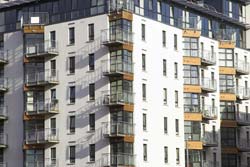South African house prices are reportedly at least 25 percent overvalued with no vigorous growth expected, according to property economist Erwin Rode.

South African house prices are reportedly at least 25 percent overvalued with no vigorous growth expected, according to property economist Erwin Rode.
Writing in the Rode’s Report Q4 2011, Rode says this is happening three years after the start of the great recession.
“Real house prices are still 25 percent more expensive than what is suggested by their trend line of the past 44 years.”
He explains that considering that asset prices are mean-reverting, the implication is that resumption in the down trend in real house prices is inevitable – it’s only a question of time and speed.
A decline in real (inflation-adjusted) house prices does not necessarily mean nominal prices will decline; a more likely outcome is that nominal prices might grow at, say, 2 percent per annum for a few years while inflation is at, say, 6 percent.
The report notes that the long-run driver of prices (or rentals) is building costs, a proxy for replacement costs.
This can be explained through the substitution principle which states that a buyer will pay no more for a property than the cost of an equally desirable alternative property.
As an example, why would one buy a newish used house for say, R120 when you could have it built for R100, according to the Rode Report?
Asked what would-be buyers should do, he says renting is the best place to be because if one buys a home now, they will not be able to achieve any capital growth on the asset for at least the next five years.
Rode says one may be tempted to say why should they make the landlord rich instead of putting money in their own house? Very simple, he says, with little or no capital growth the asset is not worth much, buying at the moment.
This is particularly true of buyers who have to obtain home loans from the banks to finance the purchase.
However, he says if you have money stashed somewhere, then it would be ideal to rather buy than rent because the markets are not looking all that pretty in terms of investing, and property remains a reasonably better vehicle.
An investor could also look at listed property as an alternative to buying a house. He says investors in this sector can expect a forward yield of 8 percent before income tax and earnings of between 5.5 to 6 percent after tax.
“Despite the fact that houses are expensive, property in South Africa is still worth considering with steady income streams when compared to other markets.”

Flat rentals in Cape Town recorded the highest growth of (+4 percent), Pretoria (+3 percent), Durban (+2 percent) and Johannesburg (+1 percent).
While some of South Africa’s top economists predict a slow growth in the economy, some believe property is where investors are rushing to put their money.
Click here to read what the economists are saying regarding South Africa’s economic growth in 2012.
The report revealed that although residential flats still outperform both houses and townhouses, rental growth remained moderate at 2.2 percent year-on-year (y/y) in the third quarter of 2011.
Over the same period, houses and townhouses rental growth grew by 1 percent y/y.
Rode says this is discouraging for investors in the buy-to-let market as these growth rates are still well below the rate of consumer inflation, which stood at 5 percent in the third quarter of 2011.
Flat rentals in Cape Town recorded the highest growth of (+4 percent), Pretoria (+3 percent), Durban (+2 percent) and Johannesburg (+1 percent).
Rode adds that with houses already seriously overpriced, residential rentals growth is not one to be overly excited about. – Denise Mhlanga









